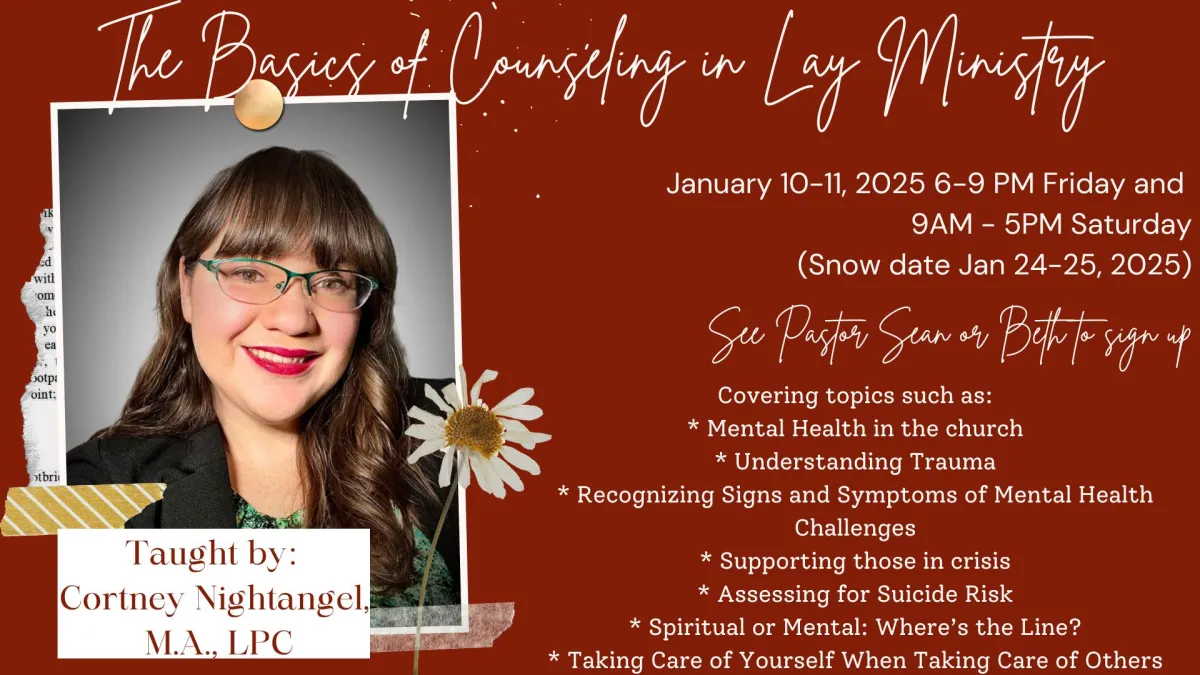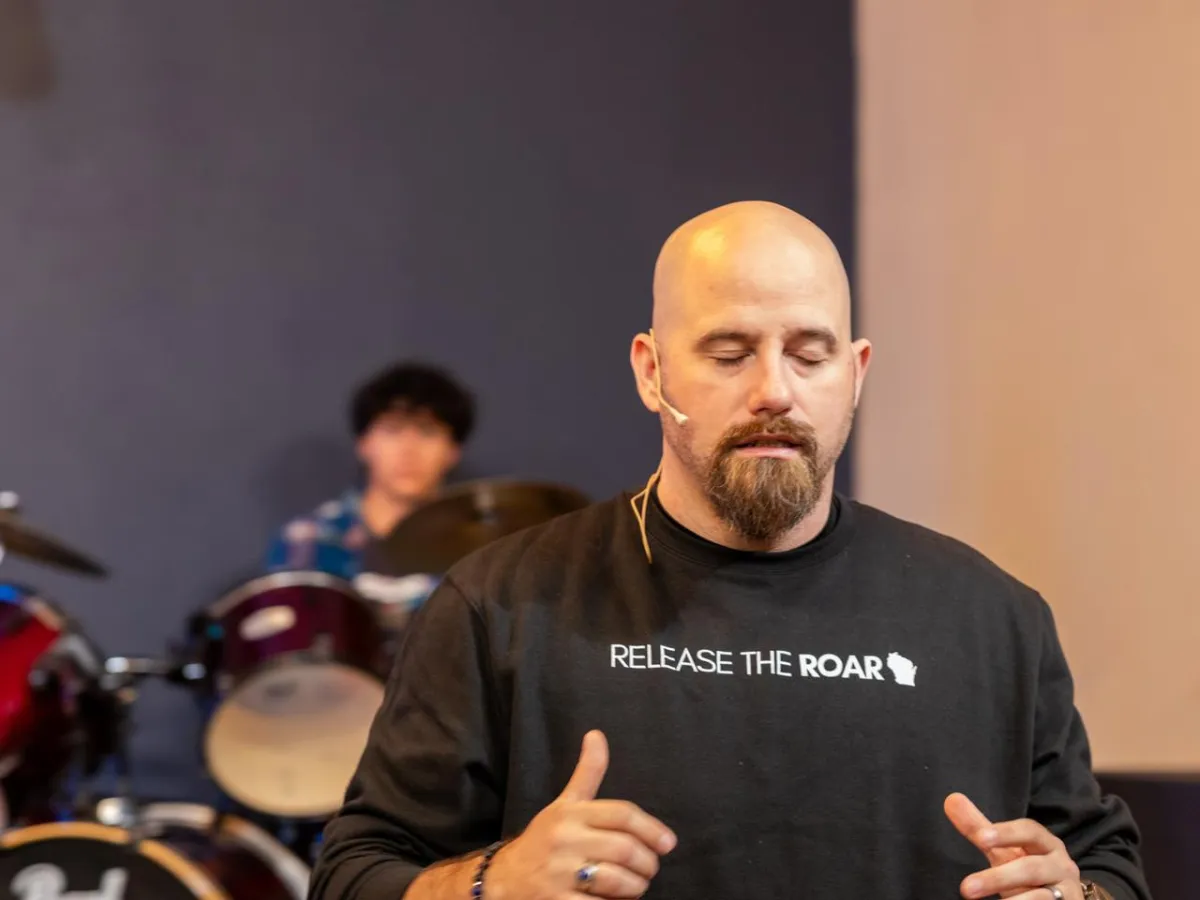Ready to visit Augusta Church
Grow in faith
with people who love
Jesus.
Join Us This Sunday
Our church is dedicated to creating a space that encourages spiritual growth and connection.

New Years Eve
December 31st @ 8pm
Game night fellowship from 8-11pm then a time of worship and prayer from 11-12:30

Basics of Counseling in Lay Ministry
January 10-11
Open to all. Offering will be taken

Christmas Eve Candlelight Service
December 24th 6:30pm
Join us for Carols, communion, and candlelight.
We simply want to know Jesus and make Him known.

Much More: The Power of God's Love and Reconciliation
In Romans 5, the Apostle Paul repeatedly uses the phrase "much more" to emphasize the boundless nature of God’s love and grace. These five statements aren't just repetitive words; they unfold a powerful argument that strengthens our confidence in God's faithfulness. Paul’s approach defies the traditional "light to heavy" logical sequence found in Jewish thought (qal wahomer), as he flips the pattern, starting with the heaviest truths and moving toward lighter implications. In doing so, Paul demonstrates that if God has already done the hardest thing—reconciling us while we were still sinners—we can be assured that He will certainly do the "lighter" things for us.
Let’s explore the first two "much more" statements found in Romans 5:9-10 and see how they work together to reveal God’s amazing plan of reconciliation and salvation.

Understanding God’s Wrath
Before diving into the "much more" statements, it’s important to recognize the starting point: the reality of God's wrath. Romans 5:9 tells us, "Since we have now been justified by his blood, how much more shall we be saved from God's wrath through him!" This verse implies that God’s wrath is not arbitrary but a righteous response to sin. It is a just consequence that every person deserves because we have all sinned and fall short of God’s standards.
Colossians 3:6 reinforces this by saying, "On account of these (sins), the wrath of God is coming." While this truth may seem daunting, it sets the stage for understanding just how radical God’s love is. It shows that the starting point of our relationship with God was not one of favor, but enmity. As Romans 5:10 puts it, "For if, while we were God’s enemies, we were reconciled to him through the death of his Son, how much more, having been reconciled, shall we be saved through his life!"
Enemies No More: The Gift of Reconciliation
Paul uses the term "enemies" to describe our position before God. In the original language, the term is passive, indicating that God was not actively against us; rather, we were actively opposed to Him through our sin. God has always been working toward reconciliation, even when we were far from Him. The clearest demonstration of this is Jesus Christ’s sacrificial death on the cross.
Consider this analogy: Imagine moving into a new neighborhood, and on the very night you move in, your house catches fire. A neighbor notices the flames, runs inside, and rescues your family, even suffering severe burns in the process. Later, when you want to show your new friend a simple yo-yo trick, your father reassures you, "If he ran into a burning building to save you, he’ll certainly take the time to watch your yo-yo trick."
This is Paul's message to us. If God already went to the extreme lengths of sending His Son to die for us while we were still sinners, how much more can we expect His love, help, and attention now that we are His children?
Reconciliation vs. Justification
Understanding reconciliation helps us grasp the "much more" statements more clearly. Reconciliation is not just a feeling of peace with God; it's a legal and transactional term. In ancient times, reconciliation was associated with exchanging goods of equal value—like trading two dimes and a nickel for a quarter. Similarly, Jesus exchanged His righteousness for our sin, bringing our spiritual account to zero.
While justification—the complete removal of sins—is instant, the process of becoming more like Christ (sanctification) takes time. Though our spiritual debt is cleared through reconciliation, we must still work to align our lives with God’s will. It’s similar to becoming financially free: even after paying off debt, the key is changing behaviors to avoid falling back into old patterns.
The Hard Part Is Done, Now Comes the Fullness of Salvation
The real beauty of Paul’s argument is that God didn't just stop at reconciliation; He invites us to experience the fullness of salvation. If He loved us enough to justify and reconcile us while we were still sinners, how much more does He love us now as part of His family?
Paul adds even more intensity by saying "more than that" in the verses that follow, pushing us to not just expect God to meet our needs but to rejoice in our relationship with Him. This rejoicing is rooted not in our efforts but in the completed work of Christ. It is His power replacing our helplessness, His goodness covering our sinfulness, and His love overcoming our apathy or hate.
The Transaction of Transformation
The "much more" statements challenge us to think beyond merely being "found" as believers. Instead of seeing non-believers as lost, Paul paints them as enemies in need of a total transformation—a change of allegiance. The goal isn't just to find them; it's to bring them into a new relationship with God where they trade what they have for the better things Christ has already paid for.
Christ does the heavy lifting in our transformation. He reconciles us to Himself, not the other way around. Our role is to accept His gift, let go of what we hold onto, and receive the freedom He offers. As we do, we move from being enemies of God to being part of His family, where we can expect not only forgiveness but an abundance of life.
Conclusion: Confidence in God’s Unfailing Love
The "much more" statements in Romans 5 remind us that God doesn’t just stop at the hard things; He goes beyond them. If He justified us while we were still sinners, how much more can we rely on His grace, mercy, and love now? This truth should give us boldness and confidence, knowing that God will not withhold any good thing from His children.
Paul’s message encourages us to expect God’s continuous work in our lives. It’s not a matter of "if" God will come through for us, but "because" He already has, we can trust Him for even more. Let us, therefore, rejoice in God through our Lord Jesus Christ, knowing that we are reconciled, transformed, and loved much more than we could ever imagine.

You're Welcome Here
Augusta Church wants to help you become the person God made you to be. No matter where you are in your journey, you’re invited to discover your purpose and live it out at Augusta Church. It’s our prayer that you feel loved and welcome just as you are the moment you walk in our doors.
Kids Ministry
Augusta Kids is all about raising up the next generation to become sons and daughters of God. We are passionate about helping children identify their strengths and their call at the youngest age possible. We desire to guide them in their relationship with God and to prepare them for the power and presence of God and His glory. We aim to teach children about who God made them to be and to embrace a biblical perspective of their life and purpose. We work to help our kids become the next supernatural generation who engage in a church where they can help bring people into freedom by healing the sick, casting out demons, feeding the hungry, and taking care of the impoverished. We look forward to helping parents raise up a generation of spiritual warriors. We don't believe children have to wait for their calling to be enacted - we don't babysit we are called to equip.

Need Prayer?
There are times when life is overwhelming, when all we have is questions. In those moments, hope can feel far away. The great thing about prayer is that it shifts our perspective towards the One who stands ready to listen. No matter what you're facing, we'd love to pray with you!

Visit Us
Ministries
© Copyright 2023 Augusta Church | All Rights Reserved
1225 W Lincoln St | Augusta, WI 54722
Powered by ChurchFlow360.com
